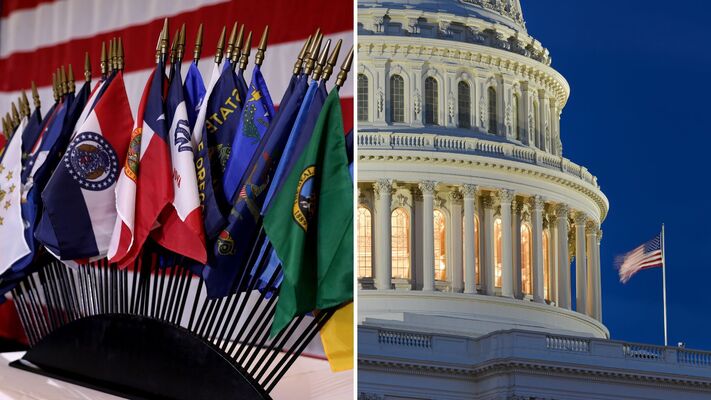Let’s talk about whom–if anyone–we should fear when it comes to the process of proposing constitutional amendments.
Article V of our Constitution outlines two paths for constitutional amendment. The first path requires Congress to propose amendments by a 2/3s vote in both chambers; then, the proposal must be ratified by 3/4s of the states. The second path allows a convention of the states to propose amendments if 2/3s of the states apply to do so. Then, the proposal must be ratified by 3/4s of the states.
In other words, Congress and the states have parallel tracks for proposing amendments, which in either case have to be ratified by 3/4s of the states. The necessity for 2/3s of the states to “apply” to hold a convention before they can propose amendments makes the state-initiated proposal path more difficult to invoke than the congressional proposal path.
There is a solid movement underway to use the state-initiated path to propose amendments specifically for limiting the power of the federal government, setting term limits, and imposing fiscal restraints from the outside in. Nineteen states have already joined this movement.
The primary obstacle to passing the required application in the remaining states is the fear that is peddled by opposition groups. One of the many reasons their rationale doesn’t make any sense is because it casts fear on only one of the two paths for constitutional amendment–and that path is the one that is, by far, the safer of the two in terms of the potential to cause the kind of mischief these opponents are so afraid of.
I have never once heard a convention opponent express fear that Congress would propose a repeal of the Second Amendment or replace the entire Constitution with a wholesale rewrite. Yet they proclaim this as a virtual certainty if the states should be so brazen as to hold a convention. Why is that?
As of this writing, 29 state legislatures are controlled by Republicans, 20 are controlled by Democrats, and one is divided. At a convention of the states to propose amendments–even if we assumed that the delegations went totally off the rails, acted beyond the scope of the call for the convention, and violated their commissions from their state legislatures–is it likely that a majority of the states would propose an amendment that eroded civil liberties? Or that they would use the opportunity to scrap the Constitution?
I personally don’t believe in making political decisions based on fear. But if I were going to let the fear of “losing the Constitution” control me, I would be far more afraid that Congress would be the body responsible for it.
Consider the following pertinent facts:
Pertinent Fact #1: If all 20 of the states with Democrat-controlled legislatures sent slates of radical progressive delegates, and if by some wild political error on the part of most of the states, the delegations agreed to a rule of proportional voting instead of voting on the one-state, one-vote basis that is the universally-followed historical precedent for interstate conventions, the radical leftists would control 190 of 435 votes. That’s not even close to the simple majority that would be necessary to even propose an amendment to the states for ratification.
Pertinent Fact #2: From 2009 to 2011, Democrats controlled both chambers of Congress under President Barack Obama’s administration. At the beginning of the 111th Congress in 2010, Democrats had a 57-41 majority in the Senate and a 256-178 majority in the House. Yet we didn’t see a single radical, leftist constitutional amendment proposal even introduced.
Pertinent Fact #3: The last time Democrats held a supermajority in Congress, the 95th Congress from 1977-1979, they did indeed propose a constitutional amendment. It wasn’t the repeal of the Second Amendment or adding a constitutional right of abortion. It wasn’t a rewrite of the Constitution. What was it? The “District of Columbia Voting Rights Amendment,” which would have caused D.C. to be treated as a state for purposes of presidential elections, representation in Congress, and Article V. Not very scary, is it? Even so, it failed to garner the necessary 38 states for ratification before it expired seven years later.
Again, a convention for proposing amendments under Article V has the same power as Congress does to propose constitutional amendments. So the question is, if Congress has never proposed radical leftist amendments, but continues to have full authority to do so any day it is in session, why should we live in such fear that a convention of the states would propose such amendments but have no fear that Congress will ever do so?
It is plainly and simply irrational.
Our nation is desperate for someone to impose fiscal restraints on Congress. We’re suffering at the hands of career politicians who are more interested in building campaign war chests than in preserving the nation for our grandchildren. It would behoove us to provide additional restrictions on federal power to close loopholes that have been opened in certain constitutional phrases. Congress will never propose such amendments; we need the states to use their Article V power to do so.
If you’re still afraid of the states meeting in convention to propose amendments, show me the math that justifies your fear.
Which is Scarier: the States or Congress?
Published in Blog on March 11, 2024 by Rita Peters


